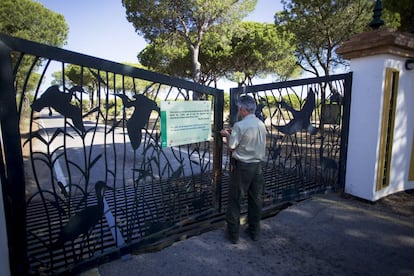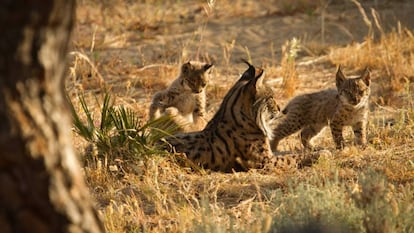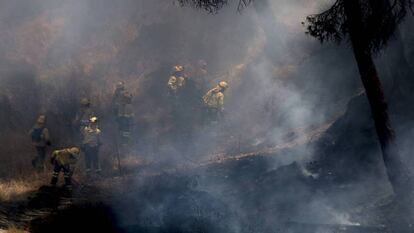Lynxes rescued from blaze in Spain’s Doñana spend night in police station
Authorities say wildfire that threatened the world-famous national park is now under control

As fire raged near Spain’s Doñana National Park on Sunday, staff at the El Acebuche lynx breeding center hurried to evacuate 14 of the felines living there, using tranquilizer darts, cages and even a huge butterfly net to round them up. But as the flames closed in, there was not time to rescue all the animals, and 13 had to be left behind.
By Tuesday morning, the more than 200 firefighters tackling the blaze that began on Saturday had largely brought the fire in the Doñana nature reserve surrounding the national park under control, preventing it from spreading into the park itself.
The decision to evacuate the center, which has been at the center of efforts in recent years to revive Doñana’s lynx population, came at around 3pm on Sunday afternoon. “You could see the smoke already,” says one of the staff about the huge fire that had spread through the wetlands in southwest Spain, a vital stopover for migrating birds and one of the last havens for the endangered Iberian lynx.

Staff at the breeding center followed established procedures for such cases: they rounded up as many lynxes as they could and left the rest free to escape if they needed to. When they returned on Monday morning, staff were relieved to see that the center had escaped the blaze and 11 of the 13 animals left behind were still there.
Staff said they were confident the two missing animals would soon turn up: “They are animals that tend to stay close to where they were born.” Unlike lynxes introduced into nature, those on the Acebuche program are not fitted with a GPS collar.
A female lynx, called Homer, died on Sunday during the evacuation. Staff said the animal probably succumbed to stress. Unable to guarantee a route out of the park, with the fire sweeping across roads, staff from El Acebuche took the animals to the police station in the nearby town of Matalascañas, where they spent Sunday night.

Miguel Delibes, an expert on the Iberian lynx who is closely involved in the recovery program at Doñana, says El Acebuche is part of a network of five breeding centers in Spain and Portugal. “We couldn’t put all our eggs in one basket,” he says. El Acebuche was the first center and its first lynx was born in 2005. Since then, the program has played a key role in protecting the highly vulnerable feline from extinction.
The Iberian lynx is the most-endangered feline on the planet, with just 483 in Spain and Portugal, according to a 2016 census. This year, 45 lynx have been born as part of the breeding program, with 38 of them still alive on June 7.
English version by Nick Lyne.
Tu suscripción se está usando en otro dispositivo
¿Quieres añadir otro usuario a tu suscripción?
Si continúas leyendo en este dispositivo, no se podrá leer en el otro.
FlechaTu suscripción se está usando en otro dispositivo y solo puedes acceder a EL PAÍS desde un dispositivo a la vez.
Si quieres compartir tu cuenta, cambia tu suscripción a la modalidad Premium, así podrás añadir otro usuario. Cada uno accederá con su propia cuenta de email, lo que os permitirá personalizar vuestra experiencia en EL PAÍS.
¿Tienes una suscripción de empresa? Accede aquí para contratar más cuentas.
En el caso de no saber quién está usando tu cuenta, te recomendamos cambiar tu contraseña aquí.
Si decides continuar compartiendo tu cuenta, este mensaje se mostrará en tu dispositivo y en el de la otra persona que está usando tu cuenta de forma indefinida, afectando a tu experiencia de lectura. Puedes consultar aquí los términos y condiciones de la suscripción digital.








































